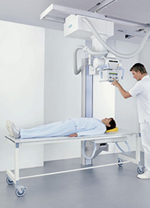As compared to other systems working with film or memory foil, fully digital X-ray systems as the Axiom Aristos VX Plus drastically reduce the number of work steps. The workflow in the hospital or private practice is greatly optimized, resulting in higher patient throughput.
 The uncomplex system configuration speaks for itself. The basic variation consists of a ceiling-mounted X-ray tube and a floor-mounted stand with a swiveling flat detector. Optionally, the user has a choice of two movable patient tables. Patients can be transported on the table into the examination room and moved across the detector. Subsequently, the X-ray tube is positioned and followed by radiation release. It could not be simpler: whether the patient is standing, lying down or sitting in a wheelchair, whether exposures are taken of the thorax or the extremities â Axiom Aristos VX Plus
proves its superb flexibility.
The uncomplex system configuration speaks for itself. The basic variation consists of a ceiling-mounted X-ray tube and a floor-mounted stand with a swiveling flat detector. Optionally, the user has a choice of two movable patient tables. Patients can be transported on the table into the examination room and moved across the detector. Subsequently, the X-ray tube is positioned and followed by radiation release. It could not be simpler: whether the patient is standing, lying down or sitting in a wheelchair, whether exposures are taken of the thorax or the extremities â Axiom Aristos VX Plus
proves its superb flexibility.
While conventional X-ray exposures involve costs for film and chemicals, flat detectors do not incur additional costs - similar to digital photography. The control image appears within seconds on the monitor. And since flat detectors compensate for incorrect exposures, repeat exposures are usually not necessary. Each examination therefore contributes toward amortization of the investment costs.
The patient profits from the new system as well. Repositioning is a thing of the past, the wait and examination times are reduced and radiation exposures are shorter. As compared to X-ray film, the detector works with half the dose â without loss in image quality which is outstanding with Axiom Aristos VX Plus: 9 million pixels, 3.5 Lp/mm high resolution, and a 43 cm x 43 cm surface characterize the detector. In addition, DiamondView, a multiscale method for image reconstruction, increases detail contrast and reduces noise.
Also, the optional Ortho package provides the possibility of combining up to four exposures of the legs or spine into an overall image.
Siemens Medical Solutions is one of the worldâs largest suppliers to the healthcare industry. The company is known for bringing together innovative medical technologies, healthcare information systems, management consulting, and support services, to help customers achieve tangible, sustainable, clinical and financial outcomes. From imaging systems for diagnosis, to therapy equipment for treatment, to molecular medicine to hearing instruments and beyond, Siemens innovations contribute to the health and well-being of people across the globe, while improving operational efficiencies and optimizing workflow in hospitals, clinics, home health agencies, and doctors' offices. Recent acquisitions in the area of in-vitro diagnostics â such as Diagnostic Products Corporation â mark a significant milestone for Siemens as it becomes the first full service diagnostics company. Employing approximately 36,000 people worldwide and operating in more than 130 countries, Siemens Medical Solutions reported sales of 8.23 billion EUR, orders of 9.33 billion EUR and group profit of 1,06 billion EUR for fiscal 2006 (preliminary figures). Further information can be found under: http://www.siemens.com/medical